Billie Joe Armstrong talks ¡Uno!, ¡Dos!, ¡Tré!
We go in-depth with the Green Day front man
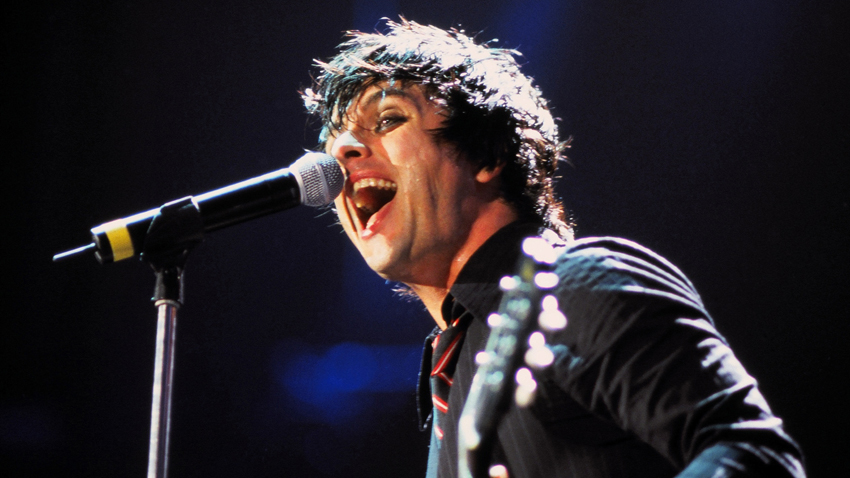
Billie Joe Armstrong talks ¡Uno!, ¡Dos!, ¡Tré!
In his only UK guitar-oriented interview, Billie Joe Armstrong tells us how he made his own amps, his secret love of shred and why Zakk Wylde should love his band's new album...
MOST bands set out with a dream that's been cast from the rock 'n' roll blueprint: play some gigs, build a fanbase, sign a record deal. Many manage the first two, and if they're really lucky, they'll achieve the third. Some bands, on the other hand, capture the attention of a generation – and very special bands manage to do so twice.
In 1994, Green Day – each member aged only 22 – took over the world. Kurt Cobain's death had left a hole in rock music, simultaneously destroying grunge and silencing the legion of plaid-alike bands that the music industry had courted for the last three years. Just as Nirvana had ushered in a sea change with Nevermind and the rallying sentiment of Smells Like Teen Spirit, Billie Joe Armstrong and his band's music struck a palm-muted chord with a generation of disenfranchised suburban slackers with one simple question on Dookie's Basket Case: 'Do you have the time/To listen to me whine?' As it turns out, they did.
Three albums later, things were different. Green Day had turned from snotty punk brats into strung-out millionaires. Subsequent releases Insomniac, Nimrod and Warning made an impact, but failed to replicate Dookie's commercial success. A new wave of sugary pop-punk had emerged, spearheaded by the likes of Blink-182 and Sum 41. By comparison, Green Day's music appeared bloated, the folk- rock direction of 2000's Warning sounded sluggish, and they were all but written off by the mainstream rock press. In the post-9/11 world dominated by paranoia, nu-metal, reality TV and 'wacky' pop-punk pranksters, a generation was left searching for something, but nobody was looking to Green Day to find it. Perhaps that's why 2004's American Idiot was such a success.
While it divided older fans, American Idiot's political subject matter – presented as a concept album complete with proggy acts, The Who-style anthems and a general feeling of being pissed off – sparked the sense of youth rebellion yet again, catapulting Green Day to the top of the charts and the biggest stages in the world.
That was eight years and two albums ago, and Green Day are back with not one but three new records (¡Uno!, ¡Dos! and ¡Tré!) set for a staggered release between now and January 2013. The first, ¡Uno!, saw the band return to a stripped-back sound that splices the infectious hooks of Dookie, while the second part of the trilogy, the "wild and sexual" ¡Dos!, hits the shops today. If anyone has a chance or three at reviving guitar music this year, it's Green Day, and speaking to Billie Joe Armstrong, it's clear that the band are re-energised and ready to rock...
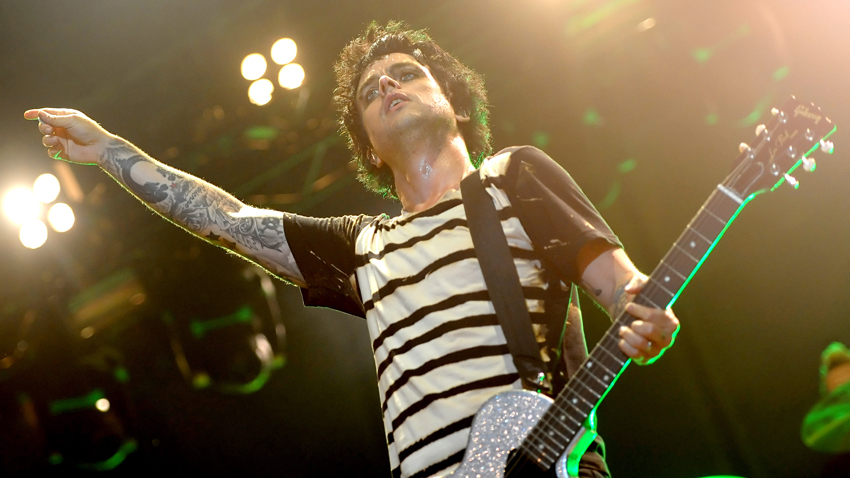
Billie Joe Armstrong talks ¡Uno!, ¡Dos!, ¡Tré!
How did the idea to make three albums come about?
“We started off when we were in Europe, and I’d write songs on days off then we’d go into a studio and just mess around, whether it was in Glasgow or Helsinki or Berlin. And then when we got home from the 21st Century [Breakdown] tour, I started writing a lot. I just wanted to get back into writing sort of basic punk-rock, power-pop kind of songs, the kind of songs that I grew up listening to and loved.
“I started making some demos and then I showed them to Mike and Tre and Jason White – our second guitar player [and long-time touring guitarist]. The four of us just ended up getting in a room all together and hashing out the arrangements and getting to know the songs. We were just kind of getting our hands dirty with it.”
It’s an ambitious prospect. How did you decide which songs would end up on each of the albums?
“The more that we played together, and the more the songs kept coming, we kept making different lists for sequences right when we got up to about 27 songs. We kept on making these lists, trying to figure out which songs sounded cohesive together. ¡Uno! is kind of like a more raw, back-to-basics Green Day sound.
"¡Dos! is more like [Green Day side-project] the Foxboro Hot Tubs or something – it’s more garage-y and kind of wild and sexual. There are more songs about f**king and things like that; it gets pretty wild and there’s kind of a party atmosphere to it. And then, the third one, there’s a bit more sweetness to it and a bit more reflection going on, but maintaining the energy that Green Day has going on.”
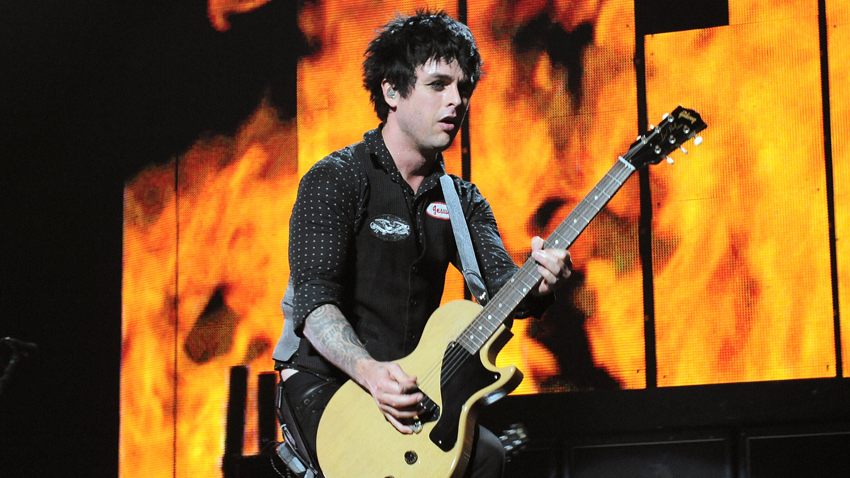
Billie Joe Armstrong talks ¡Uno!, ¡Dos!, ¡Tré!
The guitar sounds on ¡Uno! sound cleaner and punchier than on American Idiot and 21st Century Breakdown.
“I think American Idiot and 21st Century... have that kind of modern, soup’d-up Marshall sound to them. For the new stuff, it’s really stripped down, but I think that cleaner guitar sounds make for bigger sounds, actually. Sometimes, when a guitar gets over-saturated or over- distorted, the sound just gets smaller. But with this, you could just hear the wood of the guitar.”
Did you use your Gibson Les Paul Juniors for the new material?
“I played this old ’65 Double Anniversary Gretsch a lot and I played my Les Paul Juniors. I had a ’59 Les Paul – I was using that a lot for different guitar solos – and I had a Gretsch Brian Setzer Hot Rod, which is excellent, probably the best signature guitar that anyone’s ever made, so I used that for a few solos.
“I’m on the left side of the speaker and Jason White is on the right side of the speaker, and he’d play a lot of Les Paul Juniors and he’d mess around with Silvertones and things like that.”
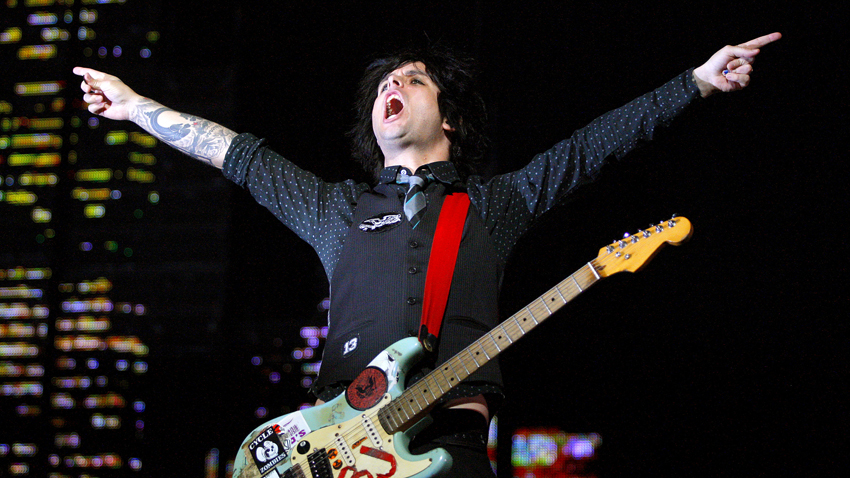
Billie Joe Armstrong talks ¡Uno!, ¡Dos!, ¡Tré!
Did ‘Blue’ (Billie’s iconic Fernandes guitar) make an appearance?
“No, Blue just sat there with us, so the spirit of Blue was in the room. Live, I’ll bring Blue out all the time for the old songs. I think at this point our fans would get mad with me if I didn’t!”
Did you use different amps on this album to achieve the cleaner sounds?
“I would go through an early 70s Marshall, or I’d use a Vox with open-back cabinets and just 2x12 speakers and that’s it. Vox did the reissue of this Vox amp – I can’t remember what model it is – but it’s just a great head [Vox Hand-Wired AC30H2 – Ed]. You can get so many different sounds out of it, so I used that quite a bit.
"I used a Boss Blues Driver to kind of get something to make the solos punch harder. My tech and I started building amps, too. So, we took the Silvertone model – the one that Jack White plays – and then kind of made our own because we kept blowing them up. We just took the diagram of how it’s made and just made amps. We did the same with another early Marshall model – we were like, ‘Well, we can’t find this amp, so let’s just build one!’
“My guitar sound is kind of in a new territory – I haven’t really messed with it before. I’ll probably end up using [this new sound] more often. I love James Honeyman-Scott, early Pete Townshend and Johnny Thunders – they’re some of my favourite players – so that was kind of the sound I was going for a bit more.”
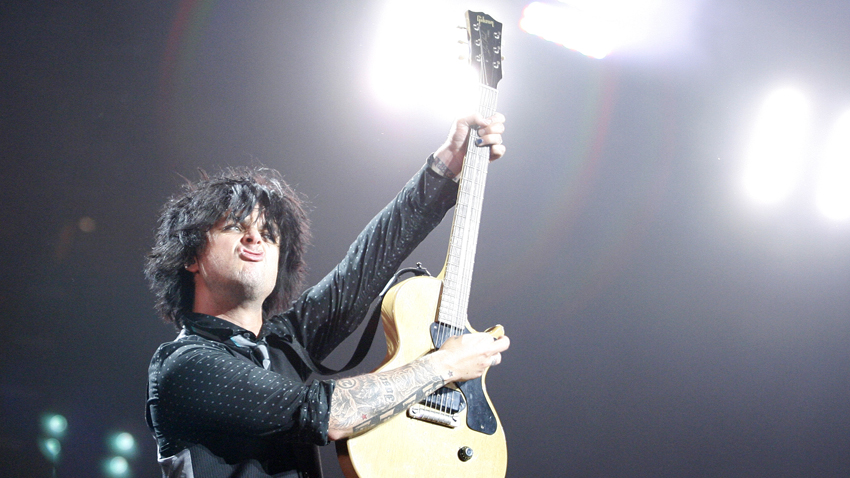
Billie Joe Armstrong talks ¡Uno!, ¡Dos!, ¡Tré!
¡Uno! featured a guitar solo on nearly every song... what’s going on?!
“The funny thing is on this record I actually play more guitar solos than I have in years. That’s kind of what came out of the room while the four of us were playing together. The more I was doing it, the more they’d encourage me to keep doing it!
"I always had it in my arsenal of guitar playing, if you will. I used to use it live, but not really, and on the very early records I did it more often. On ¡Dos! And ¡Tré! it gets even more intense. It’s more just about having fun:I wanted to be able to pull out these guitar solos on these records and just go for it.
“On American Idiot, I started getting into more tasteful, appropriate things. But, this time, I almost wanted to play things that were deliberately not tasteful and inappropriate! So, we were just like, ‘F**k it, let’s f**kin’ tear up a f**kin’ guitar solo right now!’ I kind of wanted to make Zakk Wylde’s favourite Green Day record, you know?”
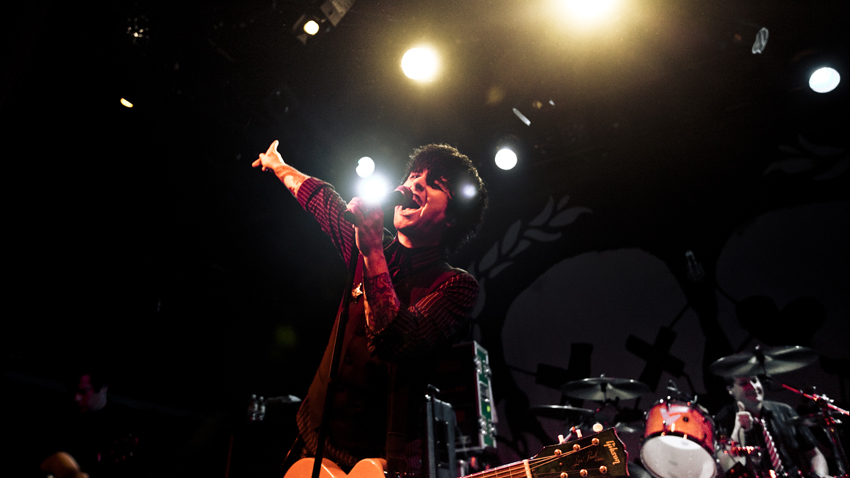
Billie Joe Armstrong talks ¡Uno!, ¡Dos!, ¡Tré!
Did you aspire to be a lead player when you first started?
“When I grew up, coming from a small area, all the rock musicians wanted to be the next shredder. And, at the same time, I was getting into punk music where there were no real guitar solos – it was more about writing the song. I was like, ‘I’m not going in that [shredding] direction, those guys come a dime a dozen.’ I just wanted to do something that was tasteful and about songwriting.”
So, by the time Dookie was released, were solos something you intentionally shied away from?
“I think, during the early 90s, people weren’t really into guitar solos so much. For us, if you listen to Dookie, the guitar solos are basically playing three or four chords. It’s literally just open... there’s nothing there! It was almost like a conscious effort not to play a guitar solo, or to do something very subtle.
"We just wanted to just bash out, like, rhythm. There were so many guitar players out there who were playing these ripping, shredding guitar solos, it seemed like that style of guitar playing had become like a dime a dozen. But, at the same time, I’ve always envied people who are able to just rip, and I’ve also gotten compliments from guys when I wouldn’t play guitar solos.
“This guitar magazine guy told me once, he was like, ‘Eddie Van Halen says you’re his favourite guitar player,’ and I was like, ‘He said that? Are you sure we’re talking about the same Eddie Van Halen?!’ I was just so flattered, because he's not citing Joe Satriani or someone like that, he's citing this guy who's just playing rhythm guitar. It was pretty cool to hear."
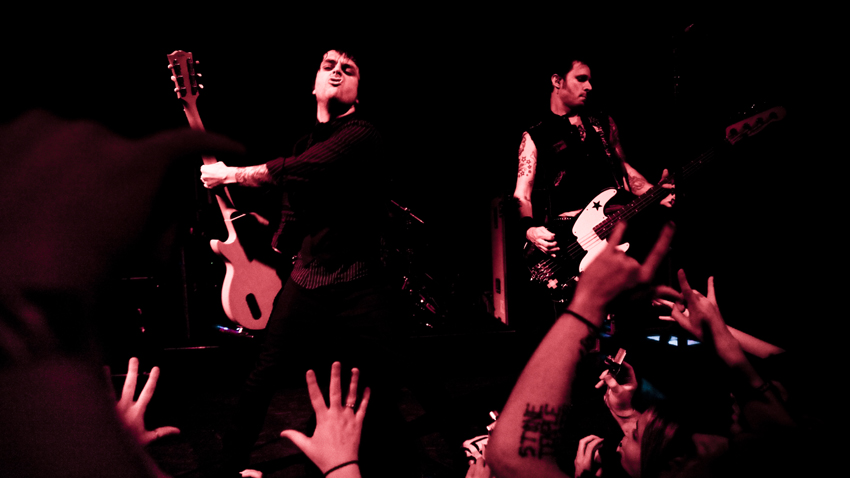
Billie Joe Armstrong talks ¡Uno!, ¡Dos!, ¡Tré!
You've always had some tight rhythm chops. Any tips for building stamina whan palm muting/down-picking?
“Yeah, well, it tires my hand out, to be honest with you! It’s just something that came quite naturally. I started doing it when I first started learning how to play guitar. I started off slow with palm muting and it just sort of worked its way into my playing. Then I heard this band called Dag Nasty, and I loved the way their guitarist Brian Baker [now of Bad Religion] played, and also Bob Mould and Bob Stinson. Then, if you take all of those elements, then somewhere you can find me in the middle.
“My right thumb is really calloused. When I started, I had this guitar teacher who tried to show me how to get those Eddie Van Halen sounds like on Ain’t Talkin’ ’Bout Love or something, using your thumb and the pick at the same time. I take it and use it to... I’m not sure what it does to the strings, but it gives it a bit more pow! A bit more of a punchy sound.”
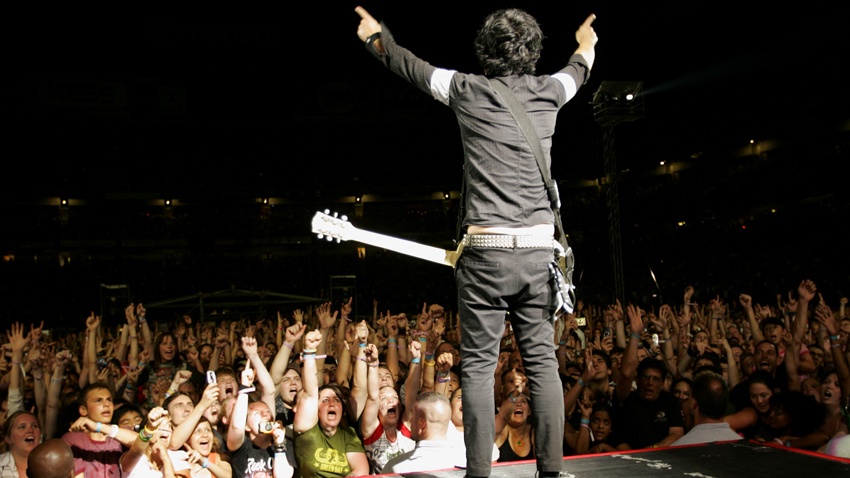
Billie Joe Armstrong talks ¡Uno!, ¡Dos!, ¡Tré!
You’ve had to defend yourself against the accusation of not being punk for almost 20 years now. Do you still consider yourself a punk guitarist?
“My answer is I don’t know if we’re a punk band or not. There’s an argument that we are a punk band, and there’s an argument that we’re not. For me, I’m so close to it that I just think of myself as being in Green Day.
“I’ve got my influences that are anything from British Invasion to early English punk- rock and the East Bay punk scene that I come from. So, that way of playing, the approach to songwriting and the politics come from that, but then there’s the dichotomy of being in one of the biggest bands in the world. People don’t really see that as being punk. It’s like, ‘I like the colour blue,’ ‘Well, that’s not blue, that’s red!’ My best argument for that question is: I don’t know! Billie Joe doesn’t know.”
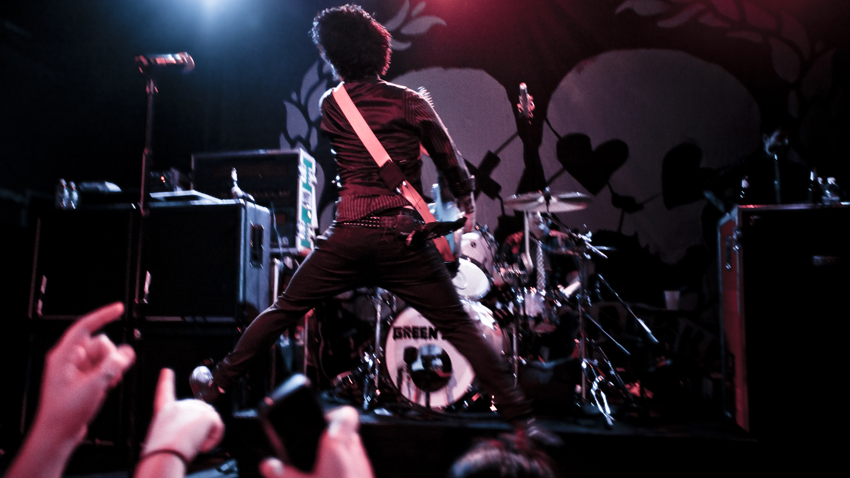
Billie Joe Armstrong talks ¡Uno!, ¡Dos!, ¡Tré!
Troublemaker seems to be a slight middle finger to those attitudes from the punk scene elite...
“Troublemaker and a song like Rusty James are kind of like a ‘f**k you’ to the old punk scene and the old guard a little bit. There are so many people who get to our age and they become bitter, and maybe their life isn’t going the way that they want it to. That’s what those songs are about. There’s a fine line between being an angry young man and being a bitter old fart, you know?
“When you step over that line... I don’t know. I mean, a guy like John Lydon is just caustic and pissed off at the whole world, and doesn’t even really have a true reason for being angry at anything any more. He represented something so strongly – with this new poetry and this new way of thinking, or a new approach to music or things that f**kin’ piss you off about society. Then, to see him turn into this guy who’s not even inspiring any more, I don’t want to end up like that: where you start turning into the antithesis of why you started getting into it to begin with.”
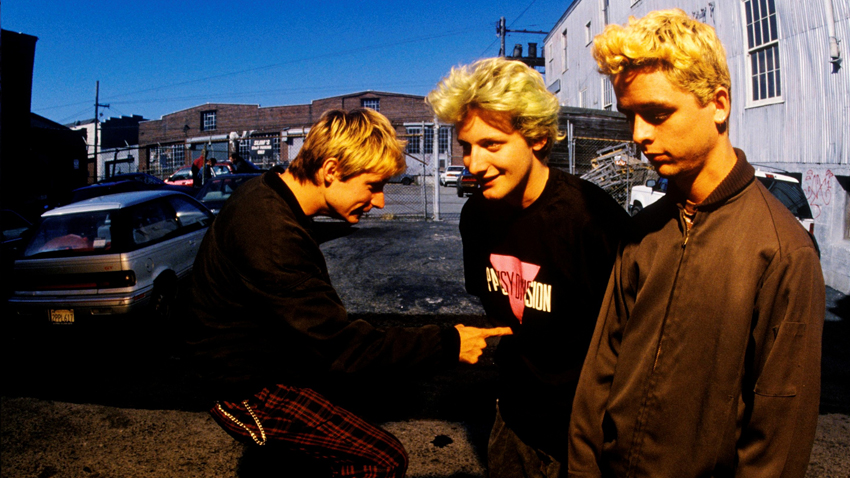
Billie Joe Armstrong talks ¡Uno!, ¡Dos!, ¡Tré!
Do you still feel a pressure with each new album to replicate Dookie?
“That’s long gone. Dookie is like a moment in time, and I’m really proud of it. We were acting our age, that’s what we were doing. We were being exactly who we were, and it was the truth. There’s still that element about us; I tell everybody, ‘I’ve been a cross between 18 and 40 ever since I was 10 years old!’
“So, I don’t know, God, no... it’s so f**kin’ long ago! I think, for me, it was always important to outgrow Dookie, to move on and to evolve, but do it slowly. It’s not like all of a sudden we were gonna turn into a techno band overnight or do this self-reinvention like David Bowie or something – it’s just not on the cards for us.
"But what we want to do is let that evolution take its course. I think, within the last 22 years of us being a band, people have grown up with us, and that’s what gives us even more of a connection to our fans than anything else. I think when people get the chance to hear ¡Uno!, they’re gonna hear that spirit.”
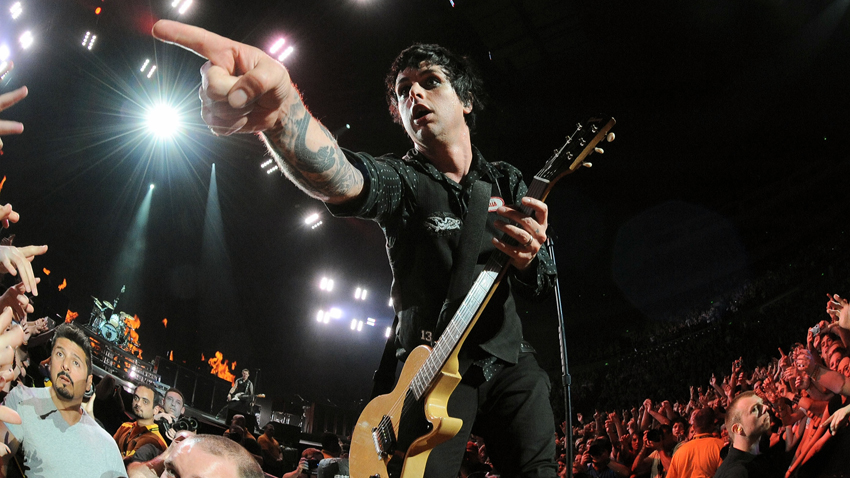
Gibby-Some Love
You’re known for your love of Les Paul Juniors. Do you mod them at all?
“No, I keep ’em totally stock. I have one that I call Floyd, and it’s the first one I ever bought. I still play it to this day. It’s used on American Idiot, 21st Century Breakdown, it’s used on this new record, and it was used on Warning. I love that guitar – it sounds amazing.”
Can we expect to see another signature model at any point?
“I’m doing one with Gibson. It’s a doublecut TV Yellow Les Paul Junior [pictured], and it’s got a single P-90 pickup in it. I’ve been playing that, so it’ll be my cheaper model that I’ll do with Gibson.”
How did your signature Gibson J-180 acoustic come about?
“The J-180 [pictured] used to be The Everly Brothers guitar, their ‘signature’. The original Everly Brothers’ guitar was sitting at Chris Lord- Alge’s studio, and I really liked it. I asked him if I could have it, and he said yeah. I started playing it, and Gibson noticed and asked if they could reissue it under my name, and I said yeah. Maybe they’ll do a cheaper one, but I don’t know.”
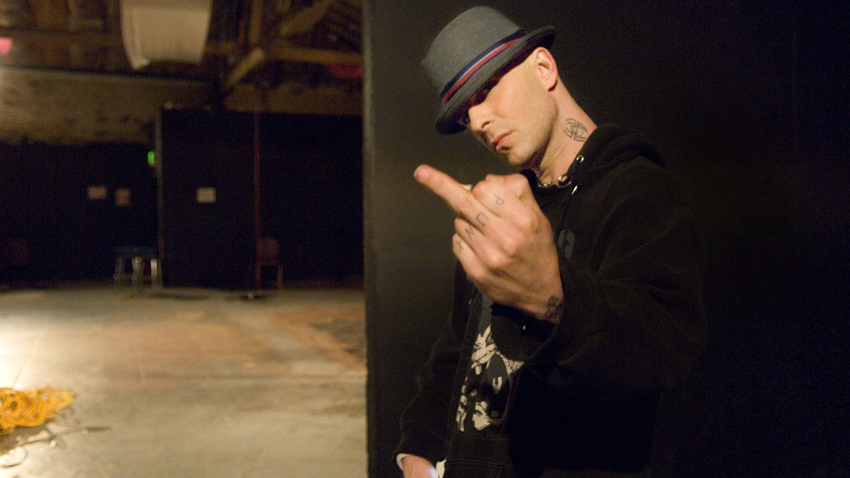
The Knowledge
Anyone who has seen Green Day live will have witnessed the break in the set, during which Billie Joe plucks members from the audience to play a cover of Operation Ivy’s Knowledge.
Operation Ivy were part of the same Gilman Street scene (centered around the club at 924 Gilman Street) in the San Francisco East Bay as Green Day, and while they only existed for two years and one album before imploding, their album Energy is crucial punk-rock listening, as Billie Joe points out.
“We actually played [Knowledge] the original way it was recorded the other day! I was like, ‘Let’s do it like Operation Ivy did it.’ We played this small club in Los Angeles and we did it and everybody f**kin’ freaked out! Energy by Operation Ivy is probably in my top five favourite records of all time.
"I was there when it came out, I was friends with those guys when it came out, and I was part of that scene. It hit me right at the right time: I was, I think, 17 when that record came out, and I just have a link to it. Green Day opened up for Operation Ivy on their last two shows that they ever played, and it meant the world to me. The politics still stand up to this day: Operation Ivy were like my Clash.”
Total Guitar is Europe's best-selling guitar magazine.
Every month we feature interviews with the biggest names and hottest new acts in guitar land, plus Guest Lessons from the stars.
Finally, our Rocked & Rated section is the place to go for reviews, round-ups and help setting up your guitars and gear.
Subscribe: http://bit.ly/totalguitar


